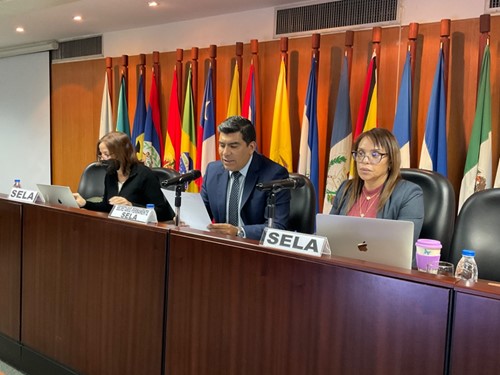
On 2 August, the Latin American and Caribbean Economic System (SELA) and the Community of Latin American and Caribbean States (CELAC) held the Seminar “Food Systems and Disaster Management” in order to learn about the situation of the region and thus design proposals to address disaster risk management for Latin America and the Caribbean at the subregional level.
“Lessons learned and criteria for a Disaster Risk Management for Latin America and the Caribbean – The subregional experience” is the name of the Round Table that is part of the joint plan of these regional integration mechanisms, through which they aim to “establish regional structures that contribute to the reduction of vulnerabilities, to the effective response to emergency situations, guided by the Sustainable Development Goals,” according to the Permanent Secretary of SELA, Ambassador Clarems Endara.
Latin America and the Caribbean do not have standardised guidelines to promote disaster risk management at the regional level. However, subregional and hemispheric organisations have developed a wealth of experience in the establishment of criteria in this area. For this reason and considering the new disaster risk situation that the region is facing, the exchange of lessons learned and the identification of regional priorities in the area of integrated disaster risk management acquire relevance in the agenda of our countries.
In this context, Ambassador Endara added that “it is well known that disaster risk is one of the priority issues for Latin America and the Caribbean as a factor that constantly causes human losses and physical damage, with great impact on the most vulnerable sectors and on economic development plans.”
He added that the region, due to its geographical position, has a high exposure to multiple threats derived from disasters associated with natural phenomena, whose risk is increased by the effect of climate change.
He said this situation has highlighted the need to mitigate economic and social fragilities in the face of these phenomena and to join efforts at the regional level to reduce risks and improve countries’ emergency preparedness.
The meeting was attended by Ambassador Sabina Frederic, Director of the Argentine Agency for International Cooperation and Humanitarian Assistance – White Helmets; Silvia Helden Molfino, Coordinator of Disaster Risk Management of the Ad Hoc Andean Committee for Disaster Prevention (CAPRADE); Claudia Herrera, Executive Secretary of the Coordination Centre for Disaster Prevention in Central America and the Dominican Republic (CEPREDENAC); Raúl Salazar, Head of the United Nations Office for Disaster Risk Reduction for the Americas and the Caribbean (UNDRR); and Luis Ernesto Díaz Curbelo, Dean of the National Academy of Civil Protection and Disaster Management at the National Experimental University of Security (UNES).
This activity was proposed as an opportunity to discuss a set of measures to integrate Disaster Risk Management (DRM) into public policy processes in this area, while recognising the fundamental role of the private sector and civil society, aligning the region’s initiatives with the Sendai Framework 2015-2030, the 2030 Agenda and the Sustainable Development Goals (SDGs) and placing them in synergy with the initiatives linked to the 2015 Paris Agreement on climate change. It will also consider health threats, considering lessons learned from COVID-19.
